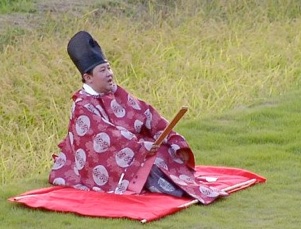Introduction
序文

Introduction
序文


The Hyakunin Isshu, in particular the Ogura Hyakunin Isshu, is a collection of 100 poems by 100 different poets. About 750 years ago, the poet Fujiwara no Sadaie (also known as Teika) selected them. They are fairly chronologically ordered from the seventh through the thirteenth centuries. The poems are all ‘waka’ (now called ‘tanka’). Waka are five-line poems of 31 syllables, arranged as 5, 7, 5, 7, 7. The simplicity and beauty of the poems is still very much appreciated in Japan and abroad.
Hokusai made a series of woodblock prints for the poems, which are shown here on each poem’s page. They represent his own interpretation of the texts, which is focused on the daily life of the Japanese. Unfortunately not all were finished. But other artists followed suit. The poems are very popular even today, and are published, sung, and available as card games in many editions.
The Hyakunin Isshu card game set has 200 cards, 100 of which contain the complete poem in kanji, and the other 100 contain the two last lines in hiragana. The game consists in finding the matching cards. One player reads from the complete card while the others try to find the matching card first. The relevant card from an ancient set is depicted on each poem’s page here. The translation of the poems is my own.
If you have some additions, corrections or comment, please send me a message. Your input is highly appreciated. There is a vocabulary list for the poems at the Kanji Go site. If you notice mistakes, have entries that explain the ancient texts better, I’d be much obliged to receive your contributions.
Together with this site a Hyakunin Google Earth folder is being prepared which will contain all the sites mentioned in this anthology. More placemarks will be added regularly. Thank you for visiting.
I wish to thank Kasumi Kobayashi, owner of the Japanese Classical Literature at Bedtime website, for her permission to use her audio readings. (You will need QuickTime to play them.) Also thanks to Scott McHugh whose Kanji Go study app provided the initial stimulus to make this site, and for his advice.
E-mail me
Eメール
© Hetty Litjens
Poem chant
百人一首
このサイトは百人一首を読みたい方や日本の文化に興味がある方や日本語を習っている方のためで作られております。歴史的に百人一首は非常に有名で、現在にも色々な事を影響しています。譚歌として、一首は五文で、音節は5、7、5、7、7であります。一首に加えて、 北斎がお書きになりました絵もついています。一首のとなりにある言葉は自分で書いた英語の訳書で、下にある絵は一首に発奮された絵です。もし間違えや手応えなどがあったら、ぜひメールで連絡してください。訪ねてくださってありがとうございます。
やまとうたは、ひとのこころをたねとして、よろづのことのはとぞなれりける。世中にある人、こと、わざ、しげきものなれば、心におもふことを、見るもの、きくものにつけて、いひいだせるなり。花になくうぐひす、水にすむかはづのこゑをきけば、いきとしいけるもの、いづれかうたをよまざりける。ちからをもいれずして、あめつちをうごかし、めに見えぬおに神をもあはれとおもはせ、をとこをむなのなかをもやはらげ、たけきもののふの心をもなぐさむるは、うたなり。
The poetry of Yamato springs from the heart of man as its seed, producing the countless leaves of language. Multitudinous are the affairs of men in this world - what their minds think, what their eyes see, what their ears hear they must find words to express. Listening to the warbler singing amid the blossoms of spring, or to the murmur of frogs in the marshes in autumn, we know that every living thing plays its part in the mingled music of nature. Our poetry, with ease, moves heaven and earth, stirs the feelings of invisible demons and deities, softens the relations between men and women, and calms the heart of the warrior.
